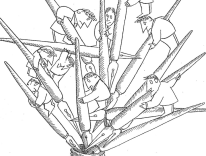Archbishop Harry Flynn of St. Paul and Minneapolis (now retired) issued a pastoral letter on "The Moral Conscience." In the face of widespread appeal to "conscience," he both stresses its importance and the responsibility of the subject to form his or her conscience in the light of objective truth, apprehended both by reason and faith.The entire letter is well worth pondering; but here is an excerpt:
Do not be conformed to this world, but be transformed by the renewing of your mind, so that you may prove what the will of God is, that which is good and acceptable and perfect. (Rom 12:2)The importance of conscience cannot be underestimated. The judgment of conscience about the goodness or evil of a contemplated act is not only a judgment on the value of the act itself, but is also a judgment on the doer of the act. His choice of action is also his choice of his own moral state. His actions reveal what he is and even contribute to making him what he is. To choose to do good is to choose to be a moral person; to choose to do evil is to choose to be an immoral person. The judgment of conscience is crucial.A human being must always obey the certain judgment of his conscience. If he were deliberately to act against it, he would condemn himself.[20] It is obvious that to act against a conscientious judgment made with certitude would really be a way of doing violence to ones own moral state. However, we must also recognize the fact that human judgment is capable of error. Even when the person making the judgment is certain that he is right, he may easily fail to grasp the question correctly or to have the full knowledge he needs or to be aware of all the facts. In such cases, the person making the judgment would be acting in good faith and would not be guilty of sin, but he would still be wrong and the evil of the act would still take place.One may be morally blameworthy for his lack of proper judgment and his own ignorance. This is the case when a man takes little trouble to find out what is true and good, or when conscience is by degrees almost blinded through the habit of committing sin. In such cases the person is culpable for the evil he commits.[21] The sources for errors in moral conduct may be varied. Ignorance of Christ and his gospel, bad example given by others, enslavement to ones passions, assertion of a mistaken notion of autonomy of conscience, rejection of the Churchs authority and her teaching, lack of conversion and of charity; these can be at the source of errors of judgment in moral conduct.[22] In either case -- whether the ignorance is or is not blameworthy -- one always has the obligation to take whatever steps are required to ensure that one removes that ignorance, since it is an obstacle to right judgment and therefore to right living. Such ignorance is always harmful.Earlier we spoke of conscience as ones last and best judgment concerning what one should choose. For that judgment to be the best judgment, one must take care to see to it that conscience (the judgment) is properly formed. Good judgment never just happens. It always demands insight and knowledge of both facts and values.


